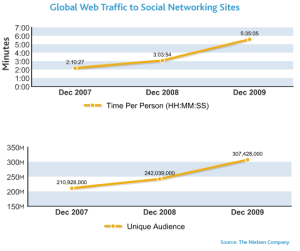I finally have a few minutes to reflect about the day and how to maneuver along this crazy highway called electronic social networking. Problem, the only thing I can think of is: I need to check my LinkedIn, Twitter, Face Book, and five other accounts just in case…

There are benefits of networking but where is the point of diminishing return? Or is there such a concept in this arena?
How much time and energy do you spend texting, twitting, linking, and face booking? If we accumulated the amount of time spent (or should I have said wasted) peering into monitors and punching keys over a full week period, do you think the minutes (hours?) would be staggering and perhaps eye-popping? Being a rookie with such technology, I thought I would take a few minutes and tally the average amount of time I actually do surf. Perhaps the following is close to your time spent? Let me know if this is consistent for a week span:
* LinkedIn, logged in on the hour and spent an average of eight minutes on the site each time
* Responded to three peer questions on LinkedIn (total time spent for each ten minutes)
* Twitted and read those twitting articles several times a day (I am not a huge Twitterer so my time was limited to personal knowledge—no doubt many out there spend hours Twitting each day)
* Face Book was checked and browsed four to five times daily
* Blogging took a great deal of time over the week; with three active blogs to keep up, I seem to be running in a circle
Add daily interruptions and now I must ask, how does any real work get done? Running several publishing, writing, and human capital firms is a full-time (70 hour week) job—heck, no wonder my hair is sprouting more salt and less pepper! Maybe it’s time to kick back and rethink what we do during the day?
All of this leads up to the concern: Is the social/media craze worth the sacrifice? At what point is enough too much and at what point are we walking around with our eyes glued to a networking device—never looking up to see if the sky is falling or if there even was a sky?
I don’t know how far this networking evolution will take civilization but I am beginning to worry about the negative effects of social media intoxication. Thus far, I’ve had the pleasure to see the following:
* Employees forgetting to work but not forgetting to network
* Students texting instead of taking notes (while an instructor I disallowed laptops, phones, and any other electronic medium in the classroom)
* Less original work being performed and being submitted (or was I imagining)
* Family members not connecting face to face, even at restaurants while sitting at the same table (go figure)
* Drivers texting while operating their vehicle
* An over all decrease of interviewing and real social skills
Don’t know about you but I believe social media networking does have a darker side associated with it. For starters, think I’ll limit the time spent on electronic toys and insist those sitting at the dinner table with me pay more attention to the people sitting at the table. Perhaps each day enjoy simplicity, noise-free simplicity…
So what if I miss a Tweet or am not the first to see a photo on Face Book… does it really matter?
dhuffman, MA, CEIP, CPRW, CPCC
Education Career Services/Career Services International
dhuffman@careersi.com




 Maybe you remember the disco hit, “She Works Hard for Her Money.” While the first part is a necessity to success, the last part is the sure sign of a loser. Clearly, Ms. Summer wasn’t giving career advice, but the sentiment of working soley for money will backfire.
Maybe you remember the disco hit, “She Works Hard for Her Money.” While the first part is a necessity to success, the last part is the sure sign of a loser. Clearly, Ms. Summer wasn’t giving career advice, but the sentiment of working soley for money will backfire. The best resumes and cover letters are written with the reader in mind. We talk a lot about telling the reader only what they need to know; now we’re going to look at making sure it’s read. To do that, we have to understand the concept of “reader investment.”
The best resumes and cover letters are written with the reader in mind. We talk a lot about telling the reader only what they need to know; now we’re going to look at making sure it’s read. To do that, we have to understand the concept of “reader investment.” them. You do it all the time, probably on this blog. If this post was one big block of text, you might opt to scroll down the page looking for a more accessible entry. Bullets jump out and grab you, so do bolded sections or headings. How many of you read that bolded paragraph before you read the entry?
them. You do it all the time, probably on this blog. If this post was one big block of text, you might opt to scroll down the page looking for a more accessible entry. Bullets jump out and grab you, so do bolded sections or headings. How many of you read that bolded paragraph before you read the entry?